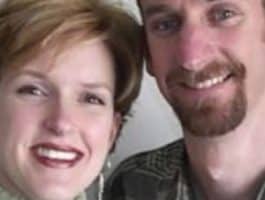
Stumbling Onto Hope
Karrie Wood, a leader with her husband, Bob, in the Celebrate Recovery Ministry, shares how God delivered her from her addiction to alcohol and bulimia when she began putting her trust in a God who forgives, transforms, and offers hope.
Show Notes
About the Host
About the Guest
-
Karrie Wood, a leader with her husband, Bob, in the Celebrate Recovery Ministry, shares how God delivered her from her addiction to alcohol and bulimia when she began putting her trust in a God who forgives, transforms, and offers hope.
-
Dave and Ann Wilson
Dave and Ann Wilson are hosts of FamilyLife Today®, FamilyLife’s nationally-syndicated radio program. Dave and Ann have been married for more than 38 years and have spent the last 33 teaching and mentoring couples and parents across the country. They have been featured speakers at FamilyLife’s Weekend to Remember® marriage getaway since 1993 and have also hosted their own marriage conferences across the country. Cofounders of Kensington Church—a national, multicampus church that hosts more than 14,000 visitors every weekend—the Wilsons are the creative force behind DVD teaching series Rock Your Marriage and The Survival Guide To Parenting, as well as authors of the recently released book Vertical Marriage (Zondervan, 2019). Dave is a graduate of the International School of Theology, where he received a Master of Divinity degree. A Ball State University Hall of Fame quarterback, Dave served the Detroit Lions as chaplain for 33 years. Ann attended the University of Kentucky. She has been active alongside Dave in ministry as a speaker, writer, small-group leader, and mentor to countless wives of professional athletes. The Wilsons live in the Detroit area. They have three grown sons, CJ, Austin, and Cody, three daughters-in-law, and a growing number of grandchildren.
-

Bob and Karrie Wood
Bob Wood, Celebrate Recovery pastor at Fellowship Bible Church (FBC) in Little Rock and responsible for 22 other Celebrate Recovery churches in Arkansas, comments, “we’re not a hotel for saints, we’re a hospital for sinners.” Wood, a recovering drug and sex addict himself and a Saddleback alumnus, leads FBC’s Friday night meetings which attract 200 to 300 regular attendees, many of them not regular Sunday churchgoers. Wood’s wife, Karrie, who is recovering primarily from bulemi...more
Karrie Wood shares how God delivered her from her addiction to alcohol and bulimia.
Bob Lepine: Karrie Wood grew up in a home that was out of control so, when she was old enough, she began to take control of everything, and it led to problems.
Karrie: My closet was color-coordinated, and the pants were with the pants and the red shirts with the red shirts, and the paper clips were organized in the same direction. That is what I did. Anything I could possibly do, I controlled – my schedule, my environment, I controlled other people, I controlled my grades, I controlled everything around me, and that's where eating disorder is as well – I'm controlling my body.
Bob Lepine: This is FamilyLife Today for Tuesday, April 16th. Our host is the President of FamilyLife®, Dennis Rainey, and I'm Bob Lepine. We'll learn today how Karrie Wood surrendered her need for control to the Lordship of Jesus Christ.
And welcome to FamilyLife Today. Thanks for joining us on the Tuesday edition. You know, if you ask people, "Did you grow up in a fairly normal family situation?" I guess most of them would look at you and say, "Well, what exactly do you mean by normal?"
Dennis: Right.
Bob Lepine: Because at some level, none of us really knows what normal is.
Dennis: Until you get married, then you get to compare your normal with your spouse's normal.
Bob Lepine: Well, that's the point: a lot of us grow up in situations where we tell other people about our past and those people say, "Well, that sounds terrible." You say, "You know, I never stopped to think about it at the time. I guess it really was terrible, but it just seemed normal to me at the time."
Dennis: That's right, because that's what you experienced. We have with us a couple this week, Bob and Karrie Wood, with whom I go to church at Fellowship Bible Church right here in Little Rock, Arkansas. They give leadership to Celebrate Recovery. Bob, Karrie, welcome back to FamilyLife Today.
Bob Wood: Thank you very much for having us back.
Karrie: We're glad to be here, thank you.
Bob Lepine: Celebrate Recovery is something that's happening in a lot of local churches all around the country, and it started out of Saddleback Church in California. As you give leadership to it, you're giving leadership to it in this local church and helping other local churches get it started throughout the state of Arkansas. Why do you think it's growing and exploding the way it is?
Bob Wood: Because everybody needs recovery, everybody's got hurts, everybody's got habits, and everybody's got struggles.
Dennis: We really don't want to admit it, do we?
Bob Wood: We don't; and I think what we do is we come to church, and we put on our church face, and what is the number one answer that everybody gives you when you ask how they're doing?
Bob Lepine: “Fine. I’m doing fine.”
Bob Wood: “I'm fine.”
Bob Lepine: “I'm doing great.”
Bob Wood: “I'm doing great.”
Dennis: But you know the New Testament says “confessing our sins one to another”. .
Bob Wood: “. . . and then we'll be healed.”
Bob Lepine: We've already heard some this week about the issues that you experienced, Karrie, as you were growing up. You grew up in a home where you had a father who was an alcoholic; your mom and dad divorced when you were four years old. You experienced physical, verbal, emotional, and sexual abuse as you were growing up.
You got involved with eating disorders at an early age. When you got to junior high and high school - that's when kids start trying to figure out “Who am I?” - what were you thinking when you started to ask the question, "Who am I?" What was showing up on your radar screen?
Karrie: Who I thought I was was a body without a soul, because I felt that in order to have any sense of self-worth or love, especially from men, meaning father figures, my dad and myself, I must be physically perfect and attractive. And if I could obtain that, then I would gain the love I always wanted. So it wasn’t about Karrie. It was about what Karrie could offer.
Bob Lepine: So everything was about making your body look as good as you could make it look?
Karrie: Yes.
Dennis: So what did you do? Throw your body at young boys in junior high?
Karrie: No, it wasn’t from any kind of sexual promiscuity. It was mainly out of an attempt to meet the world’s standards of what beauty looks like. If you’re attractive, then more people would be friendly to you; they’d be nicer to you; you’d be in the “in” crowd. I learned from my father and from other father figures in my life that what brought attention from them was beautiful women.
I desired desperately that attention from my father. So if beautiful women were what he was attracted to, then I wanted to gain that so that I would get attention – healthy attention.
Bob Lepine: And what did you do to begin to look beautiful?
Karrie: Well, unfortunately, it went through diet pills, excessive exercise. When I was in high school I was five-foot-seven, a size 3, 95-pound high school kid.
Bob Lepine: Wow!
Dennis: Ninety-five pounds?
Karrie: Ninety-five pounds.
Dennis: If Bob and I would have known you in high school, how would we have known you? What we have known you as? Were you an athlete, a scholar - what did you pour your life into then?
Karrie: I was an absolute achiever. I was involved in every sport possible; I was in drama club and key club; I was in National Honor Society - everything the school could possibly offer me. Part of that was because I didn't want to go home, so I stayed at school as long as I could, but I also wanted to try and achieve the sense of perfection.
Dennis: Were there sexual advances still being made at you by your stepfather during your high school years?
Karrie: Yes, very much so.
Dennis: You had to, at that point, begin to identify them for what they were, which was sexual abuse.
Karrie: Yes.
Dennis: What did you do with that?
Karrie: You continue on. You continue to stuff, and you continue to push yourself lower and lower and lower. The strangest thing is as much as I knew my behavior and my feelings were not healthy, I didn't know any other way. And I desperately desired the love of my stepfather; I desperately desired the love of my father. Yet, even though I knew that what I was doing wasn't really helping, that is all I knew to gain that love I wanted.
Dennis: Did you flirt with them?
Karrie: Not at all, not at all. It was strictly about just being as perfect as possible so they would be proud of me and this physical perfection that they would love me.
Bob Lepine: I'm trying to get this picture of you in high school again, and, I mean, by a lot of external standards, there had to be people going, "I'll tell you, Karrie, she is one young lady who has got her act together. She is smart, she's athletic, and she is attractive. She's going to go places. Her life is well put together."
Karrie: Absolutely.
Bob Lepine: You pull back the curtain a little bit, and there's the Wizard of Oz, and it's what everybody is seeing is just the mask that's covering over the junk.
Karrie: Absolutely.
Dennis: Karrie, there is undoubtedly a mother, maybe a dad right now listening, and they're looking at their teenage daughter, and they're thinking, "I wonder if my daughter would possibly have an eating disorder." Let's just stop for a second, and let's create a little island of clarity here for moms and dads who are fearful about their own daughters having this problem. What would you look for?
Karrie: I would look for the words that they use to describe themselves. I would look for comments that they say about other people, such as "Wow, that girl is really beautiful, look how thin she is," or they may even say extreme comments such as, "That woman is so fat." I mean, they'll come out and just be very blunt. So look for comments about other people's physical appearance and how they're relating that to themselves, that comparison of, “I am one way; they're that way.”
Also, looking for food choices. Does it seem like they're hardly eating at all one moment, and they're eating a lot the next moment? There are actually a lot of different signs, and I would really encourage them to research it. There are some wonderful books on the market; there's your website, I'm sure, that you could have things on.
Dennis: Right. And to get wise counsel before . . .
Karrie: Absolutely.
Dennis: … piercing your daughter's world and confronting that issue, because even how you confront the issue is of utmost importance.
Well, you moved all the way through high school and on into your college years. Did you go to college thinking you would find a new identity, perhaps? I mean, the teenage years are filled with self-doubt and a struggle of identity. Did you go to college thinking you'd find one then?
Karrie: I did, because right before I went to college, I was raped while five high school boys watched nearby. At that point, I was completely dissolved of self and thought, "I cannot live this life any further. I can't live in this city. I can't live in this state. I'm going to start making my own choices and I am going to start new.”
So I packed up my stuff and went on to the University of Delaware where I thought, "I'm the one who is going to be in control here. No one else is going to tell me what to do or how to feel. Everything will depend on me."
Bob Lepine: And was the university the fresh start you hoped it would be?
Karrie: No, and the reason is because wherever I would go, my problems and my hurts would go with me.
Bob Lepine: Did you meet your future husband while you were a student?
Karrie: No, I didn't. Actually, during that time my mom had been divorced from my ex-stepfather and had met another gentleman, a very wonderful, wonderful godly man, and they had decided to get married, and she was going to move to California and told me I could finish my degree here at University of Delaware or I could move to California and complete my education there.
And my mom and I were very, very close. She was my family. Despite all the things we went through, I still believe we went through it together, and I wanted to continue on with her, and so I moved to California, and that's where I met my ex-husband.
Dennis: I want to ask you a question – this is a very intimate question. After two major men in your life had failed you – first your father, then your stepfather – was there a flicker of a little girl who still wanted a relationship with a daddy with the third man who stepped into your mom's life?
Karrie: Yes. Desperately, and it was at that time where I really feel I felt God's grace, because when I first met him I was instantly in awe of him, because he was so different from anybody else.
Dennis: He was safe.
Karrie: He was tremendously safe, and what's amazing is that over the years - he actually passed away - but during those 12 or 13 years I had him in my life, he became my dad. And God used him in my life to fill a lot of those holes that I was missing from a father figure, and he showed me what a safe, loving dad is all about.
Bob Lepine: So when you move to California now, and you're in a new environment, and that's where you meet the young man who became your first husband.
Karrie: Correct.
Bob Lepine: All of a sudden, you started having emotions. You started feeling drawn to this young man. In the past, if you'd had anything like that, you would have kept it walled off and wouldn't have done anything with it. But now, all of a sudden, you decided to let a guy into your life.
Karrie: Yes, but because it was very familiar for me. He also was an alcoholic, even though I didn't identify him as one, may that be denial or anything else, I'm not quite sure, but I did not see it at that time. Physical appearance was everything in this marriage for me.
Dennis: Did he tell you what to wear?
Karrie: What to wear, how to have my hair, what clothes.
Dennis: Did he dress you provocatively?
Karrie: No, not necessarily, but he would imply so. He would regularly have pornographic magazines in the home, and so by seeing those and being aware of them, I assumed that was what he thought beautiful women were.
Dennis: What did you think of those magazines, by the way?
Karrie: I thought …
Dennis: I don't know that I've ever asked a woman on our broadcast what it would be like to see her husband having those around and looking at them.
Karrie: Extremely devalued, extremely unworthy, unloved, and that I'm not enough.
Bob Lepine: Did you say that to him?
Karrie: I did real briefly, but the conversation never went much further than that. He was not open to talking about that too often.
Bob Lepine: How long from the time that you got married until you looked around and said, "Oh, my goodness."
Karrie: Sadly enough, my wedding day. I knew the day I got married I was not to marry him. I knew deep down in my soul that this was going to be a wrong move for me, but I felt this tremendous amount of pressure that here was the wedding, everybody was coming, all this money was spent on me, and I had to go through with it.
But that didn't turn out too well, because shortly thereafter our marriage became very volatile. His drinking became worse. It wasn't helping that I'd joined in the drinking at that time. My eating disorder was at an all-time high and, unfortunately, after that point sexual abuse came into the marriage along with physical abuse.
Dennis: This was how long into the marriage?
Karrie: This was about two years into the marriage.
Bob Lepine: So, now, as a young married woman, teaching kindergarten, right?
Karrie: Yes.
Bob Lepine: You're at the end of your rope. Life has collapsed around you, and you don't know where there's any hope or any help, and you think “This is what I've got to live for?”
Karrie: Yes. I thought I would live that way the rest of my life, and I would turn 93 years old and then I would die. And that's just what life was going to offer. But then after five years, a broken nose, bruises inside and out, because abuse isn't just about marks on the outside; a lot of the abuse happens from the inside, and complete despair - my addiction to food was out of control - I finally felt God's Spirit on my heart.
At that point I didn't even know God, but I can truly say that I felt Him at that moment saying, "Karrie, you do not have to live this way any longer. Let Me help you."
And it was during that time that a friend of mine that I worked with introduced me to this ministry that started at Saddleback Church called Celebrate Recovery, and she said she would take me, and even though I had no relationship truly with God or any kind of true experience with church, I did not care. I was willing to do and go anywhere.
Dennis: You were so broken.
Karrie: I was. I had nothing left.
Bob Lepine: And you went a couple of times to Celebrate Recovery and everything was fixed and that took care of it all, right?
Karrie: I wish I could say that, but that's not true.
Dennis: But it was at Celebrate Recovery, even that first event, right, that you met Jesus Christ?
Karrie: I did. In fact, actually, it was the second evening. The first evening my friend brought me. The second week for some unknown reason, we'll say it was a God thing, the second week I had to go by myself and be quiet, and I sat in the back row. During a worship song titled "White As Snow," I sensed that I felt red as crimson, and hearing that there was a possibility that this God could make me white as wool and give me a new start, I was skeptical, but I wanted it desperately.
And during that time, Pastor John Baker, the founder, had done "The Sinner's Prayer," and said, "If anyone wants to know Jesus on a personal basis, say this prayer with me now." And I did, and I broke down, and I literally felt burdens just fall off my shoulders, and I knew my life was never going to be the same, and it wasn't.
Dennis: You know, as I was preparing for these broadcasts to talk to you, Bob and Karrie, I thought about 1 Corinthians 15:10 where Paul said, "I am who I am by the grace of God." That's true for anybody who is a follower of Christ; but for someone who came from a background like yours, as we've been listening to here, it seems even more profound.
It seems even much more of a gift that all that crimson red would be washed clean by the Savior. And that same Savior can redeem a person right now who is listening.
Karrie: Absolutely.
Dennis: What would you say to them right now if they've listened to your story, and they say, "That's me?"
Karrie: I would tell you, if you're listening, to do the same thing that God helped me to do, and that was to trust – trust that there is a God that can help and that there are others out there that are ready to take your hand and help you; that can walk alongside you and help you deal with those things and those scars that are so deep beneath.
I really realized that what was really going to set me free was the truth. It wasn't just acknowledging the pain, saying it was there, but really looking at it and allowing Him to work on it.
Bob Lepine: There were three things you desperately needed that the Gospel offers. You needed to be forgiven for your own sins, your own wrong choices; you needed that cleansing, you needed to be white as snow.
Karrie: Yes.
Bob Lepine: You needed transformation.
Karrie: Desperately.
Bob Lepine: And all of your attempts at changing things hadn't worked.
Karrie: No.
Bob Lepine: And you needed hope.
Karrie: Yes.
Bob Lepine: And the Gospel offers hope. I don't know where you find forgiveness and transformation and hope except in Jesus Christ and a relationship with Him.
Karrie: I don’t know either.
Bob Lepine: But I watch a world trying to find it in all kinds of things and places. They look high and low for those things, and what we're saying here today is that our own experience is, and the experience and the testimony of tens of thousands, is that there is one place where you can find it, and the offer is free.
Karrie: Yes.
Bob Lepine: Forgiveness, transformation and hope in the Gospel of Christ.
Dennis: And, Karrie, to that person right now who wants that forgiveness, transformation and hope, would you lead them through the same prayer that you prayed?
Karrie: I would be honored. I said, "Father, I can't see You, I can't hear You, I can't touch You; but for the first time in my life I believe You are there. I thank you for dying on the cross for me so that I can have a new life, a new life white as wool, no longer red as crimson. And I ask that You would take these burdens from me; that You would give me a new life in You; that You would set my feet straight and firm and give me the path that You have in store for me.
“Help me, Father, to know what life in You is all about, and I give myself fully to You right now. I ask that You would lead my life and give me the direction of where I should go. Thank you, Father. Amen.”
Dennis: And the promise of Scripture is if we ask anything according to His will, He hears us. We have the confidence that if He hears us, He will give us the request we have asked of Him. And so if you have asked for forgiveness, you will receive.
Karrie: Amen.
Bob Lepine: You know, I don’t know how many of our listeners have had a chance to see the short film that I watched recently that really speaks right to what we’ve been talking about here today. I want to encourage listeners to go to FamilyLifeToday.com where there’s a four-minute film that we’d love to have you view.
It’s called Falling Plates, and it gives a pretty clear picture of the Gospel – what we’ve been talking about here and how God changes a life; how He transforms our lives; how He takes what’s broken and makes it new. Again, go to FamilyLifeToday.com and click on the link to watch the video Falling Plates.
Speaking of films, Celebrate Recovery, which we’ve also been talking about here today, is featured in the film that is debuting this Friday night in theaters all around the country. It’s called Home Run. It’s the story of a major league baseball player with substance abuse problems who has to go to a program. It turns out the program he gets into is Celebrate Recovery.
He doesn’t realize everything that’s involved with it, but God uses Celebrate Recovery in his life to confront him with the Gospel and he responds to that. It’s a great movie. I had a chance to see it a few weeks ago, and we would encourage listeners to take some friends and go see it this weekend when it opens in a theater near you.
Of course, if you need more information about Celebrate Recovery, we’ve got a link to their website on our website; again, it’s FamilyLifeToday.com. Just go there and click the link and you can find out about Celebrate Recovery programs that may be taking place in a city near where you live, or how you can start a program in your church or in your community to help people struggling with addictive behaviors. Again, click the link for Celebrate Recovery at FamilyLifeToday.com.
And, finally, let me mention Dr. Ed Welch’s helpful book called Addictions: A Banquet in the Grave, where he looks at some of the spiritual roots to addictive behaviors. It’s a very helpful book. You can order a copy from us online at FamilyLifeToday.com or you can call 1-800-“F” as in family, “L” as in life, and then the word “TODAY.” Ask about Ed Welch’s book, Addictions: A Banquet in the Grave when you get in touch with us.
Speaking of Dr. Ed Welch, when he was here not long ago we had a conversation on the subject of addictions and helping people understand the spiritual dynamics that are taking place when there’s addictive behavior that’s happening. We had the opportunity to record those conversations, and the CD of our time with Ed Welch is available when you go to FamilyLifeToday.com to make a donation to help support the ministry of FamilyLife Today.
We’re listener-supported. It’s folks like you who give from time to time or become Legacy Partners and help support us each month; you guys make this program possible. We appreciate your partnership with us and we’d love to say thank you this month by sending you a copy of the CD with our conversation with Ed Welch about the subject of addictions. It may be something you need to pass along to a friend.
Go to FamilyLifeToday.com; click the button that says, “I CARE” to make an online donation and request the CD, or call 1-800-FLTODAY where you can make a donation over the phone and request a copy of the CD when you get in touch with us that way. Again, we appreciate your financial support of this ministry and we look forward to hearing from you.
We hope you can join us back tomorrow. We’re going to hear from Bob Wood tomorrow and hear a little bit about how he got introduced to alcohol as a teenager and how it got a grip in his life, a grip that would not let go. That’s coming up tomorrow. I hope you can tune in.
I want to thank our engineer today, Keith Lynch, and our entire broadcast production team. On behalf of our host, Dennis Rainey, I'm Bob Lepine. We will see you back next time for another edition of FamilyLife Today.
Bob Lepine: FamilyLifeToday is a production of FamilyLife of Little Rock, Arkansas.
Help for today. Hope for tomorrow.
We are so happy to provide these transcripts to you. However, there is a cost to produce them for our website. If you’ve benefited from the broadcast transcripts, would you consider donating today to help defray the costs?
Copyright © 2013 FamilyLife. All rights reserved.
1





